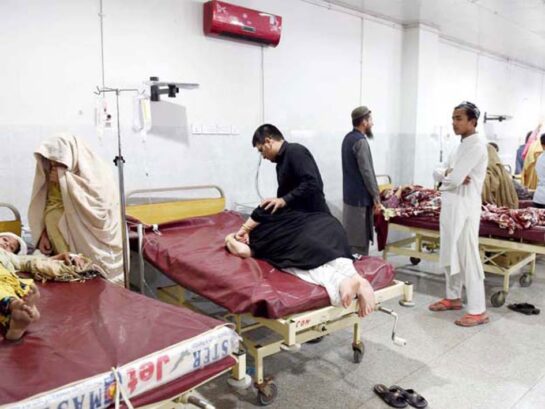WT Special Report
Pakistan’s current healthcare spending is 3% of GDP, well below the World Health Organisation’s (WHO) recommendation that a country should spend at least 6% of its GDP on healthcare.
With the dollar reserve touching 4 billion dollars after the payment of a billion dollars on Friday the economic disaster is now staring the public directly in the eyes. Pakistan is currently suffering from economic crises and fast-depleting foreign exchange reserves, weakening rupee, and worsening macroeconomic indicators.
The impact is being felt in all the major sectors, textile, agriculture and exports related industry particularlyfood and health. Food security has been endangered with food prices touching anall time high inflation rate of 30 plus.
Hospitals are shivering from the dollar depletion crises and the pharmaceutical industry is in a panic mode wondering how to get its raw material. Pakistan’s pharmaceutical industry imports raw chemicals and has not yet matured from the pill packaging stage to manufacturing medicines like India.
The government is reported to have halted or slowed down the release of dollars for imports.
News reports indicate that major hospitals have suspended complicated surgeries due to lack of medicines and other essential items. According to Masood Ahmed, chairman of the Healthcare Devices Association of Pakistan a major hospital in Karachi could not carry out eye surgeries for a month due to lack of equipment.
The future health scenario will be very depressing if the foreign reserve continues to deplete at the current rate.
Fujifilm Pakistan CEO Syed Haider Ali Naqviclaims that he has been unable to open Letters of Credit (LCs) and this development might trigger a severe shortage of X-ray, CT and MRI films for the first time in the country’s history.
The dollar shortage in the country is taking a dangerous turn – the scarcity of life-saving drugs and equipment in the hospitals is already having an impact.
The government hospitals in the capital which cater to the needsof the poorest and some blessed VIPS
are reflecting the impact of resource constraints. Pakistan Institute of Medical Sciences which used to provide free medicines decades ago is limping badly and its system is crumbling due to maladministration and staff strikes. The OPD is mostly nonfunctional and patients forced to seek private treatment.
In the bleak shadows of an imminent economic default the government is madly sticking to its strategic depth philosophy of pleasing the Talibans. While it has no funds for the local hospitals the Economic Coordination Committee (ECC) of the cabinet has approved to transfer Rs1.009 billion to government of Afghanistan in four tranches for salaries of doctors and staff of three hospitals in Afghanistan.
This decision was taken by Finance Minister Ishaq Dar last week on 3rd January 2022 on a proposal moved by the Ministry of National Health Services and Regulations.
The government should ensure the availability funds and medicines plus equipment for hospitals and the public. People first should be the policy.




